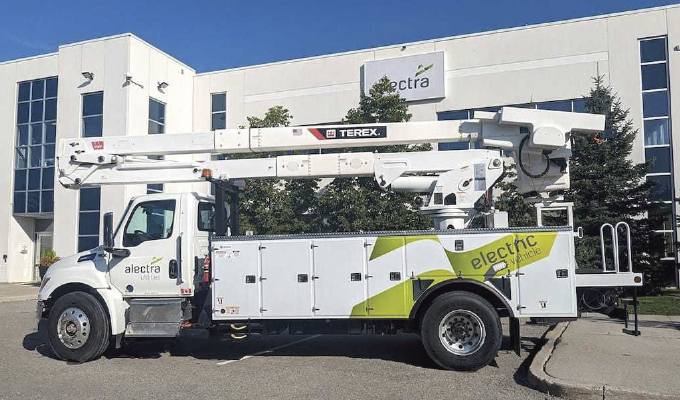ONTARIO, CANADA
Alectra Utilities, the largest municipally-owned electric utility in Canada, adds an International eMV all-electric double bucket truck to its fleet—one of the first of its kind in Ontario. The EV will be used by powerline technicians in day-to-day maintenance operations.
“The addition of our first fully electric bucket truck marks a significant step towards electrification,” says Chris Hudson, senior vice president of Network Operations at Alectra Utilities. “Integrating this cutting-edge vehicle into our fleet is part of our commitment to reducing our carbon footprint and fostering a clean energy future.”
As part of a forward-looking pilot program, Alectra’s operations team will integrate the EV bucket truck into its fleet over the next nine months. The program aims to evaluate the practicality and potential of this vehicle for future deployment. Based on the average annual Canadian vehicle emissions, adding this EV bucket truck is equivalent to removing approximately two average passenger vehicles off the road.
For more, visit www.alectra.com.
HERZLIYA, ISRAEL
StoreDot, the pioneer of extreme fast charging (XFC) battery technology for EVs, is reinforcing its commitment to advanced chemistries that ensure minimal battery degradation over the lifetime of an EV. This is done in response to recent industry claims that are touting fast charge times and extended ranges, which often overlook the potential long-term impact on battery health and the resulting degradation in vehicle’s driving range.
Dr. Doron Myersdorf, chief executive officer of StoreDot, says, “At StoreDot, we put battery safety at the top of our agenda, ensuring that cells can accept high charge rates without compromising their lifespan. This has been our North Star over the last decade of development as we have continuously refined and improved our technology, and its importance mustn’t be underestimated.”
Without proper battery chemistry frequent fast charges can lead to reduced overall battery lifespan, due to degradation as a result of power charging, which can compromise the integrity of battery cells.
StoreDot is emphasizing the importance of transparent communication from battery developers around critical factors associated with XFC such as battery health, cycle life, performance under extreme temperatures, safety parameters, and costs.
Even after 1,300 consecutive XFC cycles on a large 30-Ah format cell, StoreDot’s batteries maintain 80% of their original capacity. This makes them highly durable whilst providing XFC to EVs.
“Even though battery deterioration and a decline in the state of health over time are inevitable, EV owners shouldn’t have to sacrifice lifespan and driving range for convenient daily use,” states Myersdorf. “A driver should be able to confidently charge at a consistently high rate, every time, regardless of how full the battery is when they arrive at the charging station.”
Myersdorf continues, “OEMs are increasingly looking to extend battery warranties based on guaranteed states of health within specified mileage ranges. Thus, it’s vital that manufacturers future-proof their batteries, whilst considering the increased rollout of higher-powered charging infrastructure and evolving XFC usage patterns.”
Find out more at www.store-dot.com.




